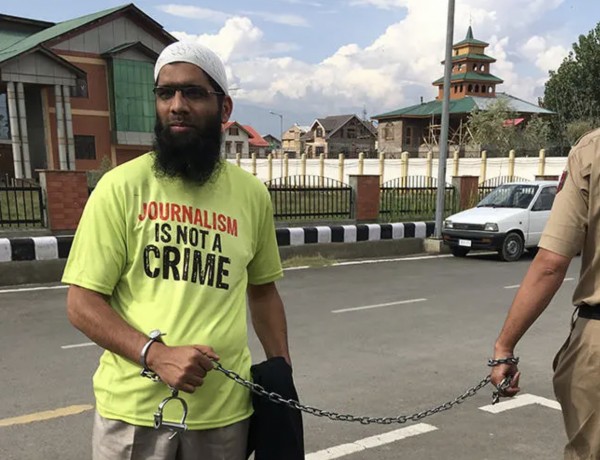IPI’s media partners in the South Asia Cross-border journalism project in Bangladesh, India, Pakistan and Nepal document press freedom violations in their countries.
Razia Rahman had to wait for six years to get a trial court’s verdict in her husband Faisal Arefin Dipan’s murder case.
One and a half years have gone by since the judgment, but she still does not know when the legal process of the case would be completed and she would get final justice.
The case currently lies pending with the High Court.
“Common people like us have nothing to do to expedite the legal process. All we can do is to place our demands for justice,” said Razia, with a tinge of sadness in her voice.
Dipan (43), owner and publisher of Dhaka-based publishing house Jagriti Prokashoni, was hacked to death by members of banned militant outfits at his office inside Aziz Super Market in the capital’s Shahbagh on October 31, 2015.
He was murdered for publishing books written by American-Bangladeshi writer Avijit Roy, who was killed on the Dhaka University campus eight months earlier. The attacks were part of a wave of violence targeting freethinkers, bloggers and agnostic writers, which started in 2013.
On February 10 last year, an Anti-terrorism Special Tribunal in Dhaka delivered the verdict in Dipan’s case, sentencing all eight accused in the case filed by Razia to death.
Appeals filed by the convicts and death references in the case are now pending with the High Court.
“After the lower court verdict, the case has now been stuck in the upper court. The sooner verdicts are delivered in all such cases from the court, the better it would be for everyone. Otherwise, the cases will get buried,” said Razia.
Although attacks on freethinkers and bloggers, and their murders by suspected Islamic militants have decreased significantly due to multiple anti-militant crackdowns, none of the families of those killed has gotten complete justice yet. Most of the victims’ family members, like Razia, blamed slow legal progress for the delayed justice.
In 2013, Bangladesh started witnessing a string of violence targetting bloggers and freethinkers by suspected Islamic militants, after a small group of secular bloggers and online activists launched a massive protest movement, demanding the death penalty for war criminals of the Liberation War and an outright ban on religious politics.
As the movement, popularly known as the “Shahbagh Movement”, gained steam, a systematic campaign to malign and brand the key bloggers as anti-Muslim and atheists began.
Then came the attacks and killings by machete-wielding militants. The motive of the attacks, as police investigation revealed, was to muzzle their secular voice, views and freethinking.
At least 10 freethinkers, bloggers and LGBT activists were killed across the country in 2015. Four of them were killed within seven months. Al-Qaeda-influenced Ansarullah Bangla Team (ABT), also known as Ansar Al Islam, was responsible for the killings, according to law enforcement agencies.
STATUS OF THE CASES
Of the cases, the trial courts concerned have so far delivered judgements in the cases filed for killing six bloggers, while the High Court gave the verdict in one case, filed for killing blogger Ahmed Rajib Haider, who was the first secular blogger to have been killed by militants.
The Appellate Division of the Supreme Court is yet to start hearing the appeals filed by the convicts, challenging the HC verdict in the Rajib murder case.
Trial proceedings of the remaining three murder cases are now with the lower courts.
Thirty-two-year-old Rajib, who was at the forefront of the movement, was hacked to death near his residence in the capital’s Mirpur on February 15, 2013.
Two years later, a Dhaka court sentenced two ABT members to death and six other operatives to different terms in jail over Rajib’s killing.
The High Court upheld the trial court verdict on April 2 in 2017, confirming the death of two people and different terms in jail for six others.
Rajib’s father Nazimuddin, however, expressed disappointment over the High Court judgment saying that he did not get justice.
The Appellate Division of the Supreme Court is yet to start the hearing on the appeals filed by the convicts challenging the HC verdict.
Eleven days after Rajib’s death, came another attack.
This time, US-based Bangladeshi writer-blogger Avijit Roy was hacked to death near Dhaka University’s TSC when he, along with his wife Rafida Ahmed Bonya, was coming out of Ekushey Book Fair. Bonya suffered serious stab injuries while trying to save her husband.
For the killing of Avijit, a tribunal in Dhaka on February 16 last year handed down death sentences to five militants and life imprisonment to another.
The case is still pending with the High Court.
The state of Ananta Bijoy Das’s case is quite similar.
The writer was hacked to death at Sylhet’s Subidbazar on his way to work on May 12, 2015. ABT later claimed responsibility for the killing but it took seven years for the trial court to come up with a verdict.
On March 30 this year, the Anti-Terrorism Special Tribunal of Sylhet handed down the death penalty to four ABT operatives, which is currently pending with the HC.
LGBT rights activist Xulhaz Mannan and his friend Mahbub Rabbi Tonoy were hacked to death inside Xulhaz’s Kalabagan residence in the capital on April 25, 2016.
Xulhaz was also the editor of an LGBT community magazine “Roopbaan” and a former USAID official, while Tonoy was an activist of the theatre group Loknatya Dal.
An Anti-Terrorism Special Tribunal of Dhaka sentenced six members of the banned militant group Ansar-al-Islam on August 31 last year for the murders.
However, the appeals filed by the convicts of the case are now pending with the HC.
The status of three other cases is not encouraging in any way.
On March 30, 2015, blogger Oyashiqur Rahman Babu was attacked by three cleaver-wielding ABT members in the capital’s Tejgaon industrial area. The case filed over his murder is under trial at a Dhaka court.
Trials of the cases filed over the murders of two other bloggers — Niladri Chattopadhyay Niloy in the capital’s Goran on August 7, 2015, and Nazim Uddin Samad at old Dhaka on April 6, 2016 — are yet to begin.
Police pressed charges against 13 ABT operatives in the Nilardi murder case. On January 22 this year, the trial court framed charges against the accused. No prosecution witness appeared before the court for depositions after the charge framing, according to court sources.
Nazim Uddin Samad, a student of law at Jagannath University, was hacked and shot dead in Old Dhaka. On August 18, 2020, police pressed charges against nine members of Ansar Al Islam in the case, but the charges are yet to be framed against the accused.
FAILURE OF STATE APPARATUS
Speaking about the issue, Barrister Jyotirmoy Barua, a leading human rights lawyer, said for any criminal case in Bangladesh, it is the state’s responsibility to investigate it, produce the witnesses before the court through the public prosecutor, and present all the evidence through its different state apparatus like the police.
“And here it is the state apparatus who failed to ensure justice,” he said.
“In our country, judges do not have the inquisitorial power as they neither produce the witness nor bring evidence. All these are done by the people involved in the prosecution side. So whether a case would move swiftly or slowly, it all depends on the state apparatus,” said Jyotirmoy.
Meanwhile, bloggers and online activists are also unhappy with the delay. They also fear that their freedom of expression is gradually being curtailed with the delay in justice.
Secular blogger Omi Rahman Pial said the space for freedom of expression has been shrunk in Bangladesh due to various legislations like the Digital Security Act.
Pial said while the secular bloggers, freethinkers, atheists and agnostics are the worst sufferers of the shrinking space, bigots and fundamentalists are the biggest beneficiaries of the situation as they use the clause of “hurting religious sentiment” on anyone for their writing.
“Do we have the freedom to speak our minds freely on important issues now? People cannot write or say what they want to. And I fear that they won’t be able to do it further in the coming days. It’s a horrific situation and I don’t see any solution anytime soon,” he said.
He also said the government needs to take bolder steps to ensure the security of all so people can speak their minds and none can be framed for expressing their views.



